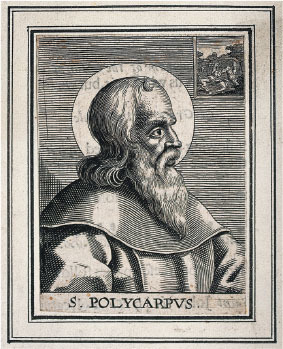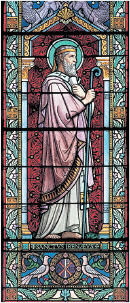Early Christianity offers some written treasures outside the Bible worth reading
 Polycarp was martyred at the stake and stabbed at age 86.
Polycarp was martyred at the stake and stabbed at age 86.
 Irenaeus wrote Against Heresies just 150 years after the crucifixion of Jesus PHOTOS: WIKIPEDIA / CREATIVE COMMONS
Irenaeus wrote Against Heresies just 150 years after the crucifixion of Jesus PHOTOS: WIKIPEDIA / CREATIVE COMMONS
If we don’t get to know early Christianity as it came forth from the Apostles’ labours, we miss out on much that is intriguing, inspiring and instructive.
In the first generations after the Apostles, Christianity as we know it began to take shape and significant written works appeared.
The Didache (The Teaching), believed to be written between AD 80 and 130 (so possibly in the lifetime of the Apostle John), contrasts the way of life to be walked by Christ’s followers and the way of death taken by others. How to elect good leaders for the Church, assess and respond to travelling prophets, and administer baptism and the Lord’s Supper are covered – all in about 30 pages.
In addition we have a writing from someone who, according to Early Church accounts, was the coworker the Apostle Paul referred to by name in Philippians 4:3. Around AD 95 Clement of Rome wrote a lengthy letter to the Corinthians, urging this ever-fractious congregation to step back from all the divisiveness they continued to show. In the letter Clement shows how profoundly he respected Paul and lays out the beauty of the Christian faith winsomely.
Extrabiblical material also includes writings from three leaders the Apostle John taught in his old age.
Three taught by John
Ignatius of Antioch wrote seven encouraging letters (six to various churches and one to Polycarp, a fellow student of the apostle) while on his way to martyrdom in Rome (around AD 110). They are fascinating presentations of what an esteemed leader of the Ancient Church wanted Christ’s followers to know and be as His people.
Papias, a second student of John, collected the sayings of the Lord and the apostles in a series of books (now, regrettably, mostly lost except for brief excerpts quoted by others).
The third student was Polycarp of Smyrna, who was a young man when he studied under the apostle. Polycarp wrote a letter to the Philippians (around AD 111), offering profound insights into faith and practice.
In Polycarp’s old age (he died a martyr around AD 156 at age 86), he instructed many young men – including Irenaeus, who eventually travelled west and became the leader of the church in Lyon (then the second-most important business city in the western half of the Roman Empire).
Irenaeus
Irenaeus became the Church’s first great theologian after the apostles. In the AD 180s he wrote a massive work in five volumes Against Heresies. In careful detail he laid out the views of various groups of Gnostics (who taught salvation comes via specialized knowledge supposedly passed on to them secretively by Christ). He critiqued them from (Old Testament) Scripture, the words of Christ recorded in the Gospels and the writings of the apostles. Then he laid out the Christian faith in contrast, glorying in the wonder of the incarnation, life, death and resurrection of Christ.
In his old age John taught Polycarp. In Polycarp’s old age he taught Irenaeus.
But notice – Irenaeus, writing in the AD 180s, was the spiritual grandson of the Apostle John. In his old age John taught Polycarp. In Polycarp’s old age he taught Irenaeus. And what does Irenaeus insist on, time and again, in Against Heresies? That we dare not teach anything other than what the apostles have taught, who themselves taught us what Christ said.
Irenaeus was especially careful about what he taught in his sermons and writings. And he claimed what he taught was also proclaimed in every church founded by an apostle. He was basically inviting anyone to verify his teachings anywhere in the known world. He was confident the apostles’ message had taken root and borne the fruit of genuine Christian faith throughout the world.
With that we can benefit if we read what Irenaeus taught – which, he would affirm and the Early Church would agree, was the Christian faith, pure and simple.
